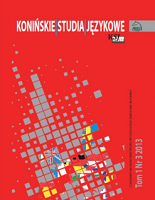Investigating learners’ affective relationships with their foreign languages: From amotivation to love
Investigating learners’ affective relationships with their foreign languages: From amotivation to love
Author(s): Xavier Martin-Rubió, Irati Diert-BotéSubject(s): Education, Applied Linguistics, Psycholinguistics, Sociolinguistics, Higher Education
Published by: Akademia Nauk Stosowanych w Koninie
Keywords: affect; emotions; motivation; love; narratives;
Summary/Abstract: This study explores the emotional relationships that 16 first-year university students at a Catalan university display towards English (and Spanish in one case) in order to understand how these relationships have been constructed and are being constructed based on their language learning and using experiences. Data were collected by means of individual and group interviews, and a qualitative analysis of their narratives has been carried out by using Georgakopoulou’s (2006) concept of ‘small stories’. The analysis of the participants’ stories reveals five different types of emotional relationships with the languages in a gradient that goes from those who have no emotional connection towards the language whatsoever to those who feel a deep passion, or love, for it. Findings indicate that: (a) external/internal circumstances play a key role in the way students’ relate, use and feel towards the languages; (b) these circumstances are dynamic and therefore the emotional relationship with these languages might change over time (as the experiences of two participants show); and (c) there is an important distinction between feeling motivated (even if intrinsically) to feeling passionate about a language. In this sense, passion, or love, appears to be a much more powerful driving force than motivation because passionate learners’ conceive such language as a fundamental part of their Self.
Journal: Konińskie Studia Językowe
- Issue Year: 9/2021
- Issue No: 3
- Page Range: 357-378
- Page Count: 22
- Language: English

